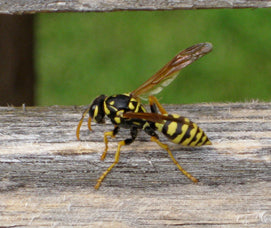
Your bees have worked hard. They've gathered enough delicious honey not only for you to enjoy, but to get them through the winter. Then one day, you go check the hive, and it's been robbed! Stripped clean! Not a drop of honey can be found.
Italian bees are more prone to rob their neighbors than other bees. Bees will not rob if nectar is readily available. Robbing usually occurs when nectar is no longer available. Strong colonies will attack weak colonies, or those that are poorly guarded. They won't touch the pollen, they are only there for the honey.
Like any good crook, robbers bees have a plan. Robber bees are nervous, noisy, and fly timidly and shiftily. They land on the entrance board and dodge when guards catch them. They will eventually force their way into the hive, take the honey, and fly off. When they return to the their own hive, they recruit fellow hive mates to attack the honey source.
Guards will protect their hive from the robbers, and combats will take place. Many bees will die from both colonies. If the robbers succeed in overpowering a colony, they will strip it of all its honey; they rip the caps off the honey in the combs and sip the honey, leaving the surface torn and messy. Once a colony successfully robs honey, they are more likely to continue invading other weak, nearby hives.
Watch for honey robbing by wasps or other bees as well. And if yellowjackets are freely going in and out of your hive, it is probably too late to save your hive. Yellowjackets eat brood, adults (dead or alive), and honey. If you see yellowjackets, open the hive and see if any bees have survived. If there are survivors, you can combine them with another hive. Just make sure that all the yellowjackets are gone before you do so.
